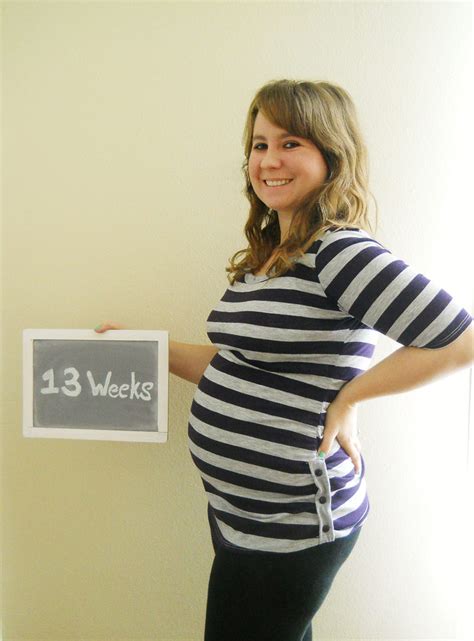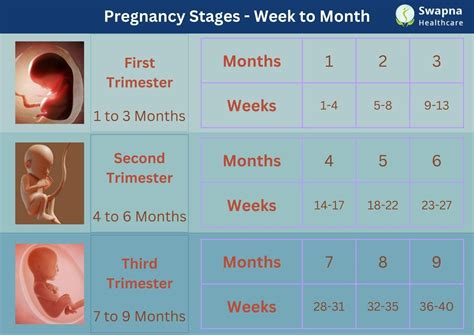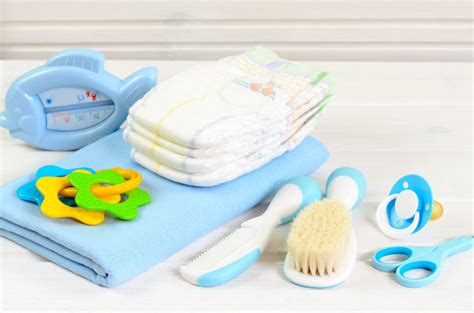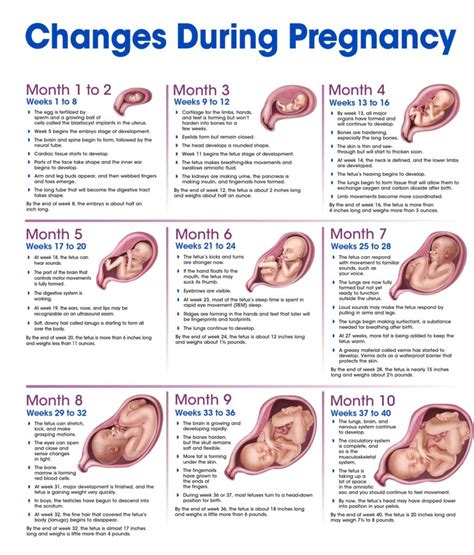Intro
Discover the 13 weeks pregnant bump, a crucial milestone in fetal development, featuring noticeable belly growth, fetal movement, and significant physical changes, marking the end of the first trimester and the beginning of a new phase in pregnancy.
At 13 weeks pregnant, many women are eager to know what to expect and how their body will change. This period is crucial as it marks the end of the first trimester, a time when the risk of miscarriage decreases, and the excitement of pregnancy becomes more tangible. For many, the 13th week is when the pregnancy bump starts to become more noticeable, although this can vary greatly from one woman to another.
The first trimester is a time of significant development for the fetus, and by the 13th week, many of the major organs and body systems have begun to function. The fetus's heart beats rapidly, and its limbs, fingers, and toes are fully formed. The skin starts to thicken, and fat layers begin to form. This period is also when many women start to feel more connected to their pregnancy, as the initial symptoms of the first trimester, such as nausea and fatigue, may begin to subside.
As women approach the 13-week mark, they often have a lot of questions about their body's changes, the health of their fetus, and what they can expect in the coming weeks. The 13th week is a significant milestone because it's around this time that many couples decide to share the news of their pregnancy with friends and family. It's an exciting time, filled with anticipation and preparation for the new addition to the family.
Physical Changes at 13 Weeks Pregnant

At 13 weeks pregnant, women may notice several physical changes. One of the most noticeable changes is the size of the belly. While every pregnancy is different, many women start to show a small bump around this time. The bump may be more pronounced in women who have had previous pregnancies, as their abdominal muscles may be more relaxed.
Other physical changes include:
- Back pain: As the uterus expands, it can cause the back to arch, leading to back pain.
- Breast changes: Hormonal fluctuations can cause breast tenderness, swelling, and darkening of the nipples.
- Fatigue: While the initial exhaustion of the first trimester may lessen, many women still feel tired due to the body's increased demand for blood and oxygen.
- Mood swings: Hormonal changes can lead to mood swings, irritability, and emotional sensitivity.
Emotional Changes and Support
Emotional support during this period is crucial. The mix of hormonal changes and the anticipation of motherhood can lead to a wide range of emotions. Many women feel a deep connection to their fetus and may start to think about parenting styles, baby names, and nursery decorations.Support from partners, family, and friends can make a significant difference. Open communication about feelings, fears, and expectations can help strengthen relationships and prepare everyone for the new baby. Additionally, joining pregnancy support groups or online forums can provide a sense of community and help women feel less isolated.
Fetal Development at 13 Weeks

By the 13th week, the fetus is about 3 inches long and weighs approximately 0.7 ounces. Despite its small size, the fetus is fully formed, with all major organs and body systems present. Some notable developments include:
- Sensory development: The fetus can detect light and darkness, and its taste buds are starting to develop.
- Motor skills: The fetus can swallow, kick, and even suck its thumb.
- Organ development: The pancreas starts producing digestive enzymes, and the thyroid gland begins to function.
Prenatal Care and Tests
Prenatal care is essential during the 13th week. Regular check-ups with a healthcare provider can help monitor the health of both the mother and the fetus. Some tests that may be conducted around this time include: - **Ultrasound:** To confirm the due date, check for any abnormalities, and determine the sex of the baby (although this may not be possible until a later date). - **Blood tests:** To check for anemia, blood type, and any infections. - **Urinalysis:** To check for sugar, protein, and any signs of infection in the urine.Nutrition and Health

A balanced diet rich in essential nutrients is vital for the health of both the mother and the fetus. Key nutrients include:
- Folic acid: Crucial for preventing birth defects of the brain and spine.
- Iron: Essential for the production of red blood cells.
- Calcium: Necessary for the development of the fetus's bones, teeth, and muscles.
- Protein: Important for the growth and repair of tissues.
Staying hydrated by drinking plenty of water and limiting caffeine and sugary drinks is also recommended. A healthy diet combined with regular physical activity, such as walking or prenatal yoga, can help manage weight gain and reduce the risk of gestational diabetes and hypertension.
Exercise and Activity
Engaging in safe physical activities can provide numerous benefits during pregnancy, including: - **Improved mood:** Exercise releases endorphins, which can help alleviate symptoms of depression and anxiety. - **Better sleep:** Regular physical activity can improve sleep quality. - **Weight management:** Exercise can help manage weight gain and reduce the risk of complications.However, it's essential to choose activities that are safe for pregnant women, such as swimming, cycling, or brisk walking, and to listen to the body and rest when needed.
Preparing for the Baby

As the pregnancy progresses, many couples start preparing for the arrival of their baby. This can include:
- Setting up the nursery: Decorating the nursery and preparing all the necessary items, such as a crib, changing table, and baby clothes.
- Taking parenting classes: Learning about childbirth, breastfeeding, and parenting techniques.
- Financial planning: Budgeting for baby expenses, such as diapers, formula, and childcare.
Preparing emotionally and practically can make the transition to parenthood smoother and more enjoyable.
Building a Support Network
Having a strong support network is crucial for new parents. This can include: - **Family and friends:** Relying on loved ones for emotional support and practical help. - **Online communities:** Joining online forums or social media groups for pregnant women and new parents. - **Professional help:** Considering hiring a doula or a night nurse for additional support during and after childbirth.A support network can provide valuable advice, emotional support, and help with daily tasks, making the journey to parenthood less overwhelming.
Conclusion and Next Steps

Reaching the 13th week of pregnancy is a significant milestone. As women enter their second trimester, they can expect their belly to grow, and their fetus to continue developing rapidly. Staying informed, maintaining a healthy lifestyle, and building a support network are key to a positive pregnancy experience.
For those who have reached this stage, the next steps include continuing prenatal care, preparing for the baby's arrival, and enjoying the journey to parenthood. Whether it's reading up on parenting tips, attending prenatal classes, or simply enjoying the feeling of the baby's movements, every moment counts.
What are the common symptoms at 13 weeks pregnant?
+Common symptoms include back pain, breast changes, fatigue, and mood swings due to hormonal fluctuations.
How big is the fetus at 13 weeks?
+The fetus is approximately 3 inches long and weighs about 0.7 ounces, with all major organs and body systems present.
What prenatal tests are conducted around the 13th week?
+Tests may include ultrasounds to confirm the due date and check for abnormalities, blood tests to check for anemia and infections, and urinalysis to check for sugar, protein, and infections.
We invite you to share your experiences, ask questions, or offer advice to others who are on a similar journey. Your insights can provide valuable support and help create a community that celebrates the miracle of pregnancy and parenthood. Whether you're a first-time parent or have been through this journey before, every story counts, and every piece of advice can make a difference.
